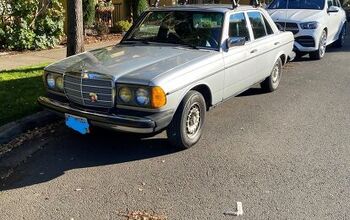Purists Rejoice: There Will Never Be a Volkswagen GTI SUV; Golf GTI Cruising Along Nicely in America
Got your heart set on a 2018 Volkswagen Atlas, one with upsized wheels, stickier tires, bigger brakes, some red piping around the grille, and tartan seats?
I feel you. But Volkswagen’s illustrious GTI range is not about to co-sign any legislation on the other side of the aisle. Atlas? Tiguan? Tiguan Limited? Touareg? T-Roc? Amarok? Westfalia? Eurovan?
No.
“I think with the three [GTI models] we have now, we are set,” Volkswagen board chairman Herbert Diess told Autocar.
Unfortunately for the United States hot hatch market, however, only one-third of Volkswagen’s GTI lineup actually makes it to America.
Maybe a Tiguan GTI wouldn’t be so bad?
Volkswagen’s Herbert Diess isn’t ruling out performance utility vehicles altogether. In reference to a hot version of the upcoming T-Roc, “We have another sub-brand R which we are considering [for such a model],” Diess says.
Diess is therefore open to the idea of fast Volkswagen crossovers, and why wouldn’t he be? The U.S. market, for example, now generates more total sales with SUVs/crossovers than with passenger cars. There are performance SUVs aplenty in the luxury sphere, enhancing profit margins and allowing buyers who want utility and performance to have their cake and eat it, too.
Adopting such a practice in a lower price bracket will surely seem obvious at some point. Yet for the time being, high-performance variants of mainstream SUVs/crossovers are rare, though an N-badged Hyundai Tucson seems likely.
Nevertheless, Volkswagen will reserve the GTI practice for hot hatchbacks. GTI, says Diess, “should be this car – a hot hatch.”
Despite great difficulties for the Volkswagen brand in America over the last few years — sales were plunging before the diesel emissions scandal rocked the automaker in late 2015 — the Golf GTI continues to be a success for the brand. Excluding wagons, 48 percent of the Golfs sold in the United States through the first five months of 2017 were GTIs. Factor in the all-wheel-drive Golf R and performance Golfs accounted for 60 percent of Golf hatchback sales and more than one-third of total Golf sales.
In fact, Golf GTI sales are up 2.5 percent, year-over-year, in early 2017, rising beyond the record levels achieved by the Golf GTI in calendar year 2016. Volkswagen of America reported 23,934 Golf GTI sales in 2016, 59 percent better than the annual average achieved by the Golf GTI over the previous decade.
Across the entire Golf performance lineup, GTI and R inclusive, Volkswagen reported 11,151 U.S. sales in 2017’s first five months, 2,379 fewer than Subaru managed with the WRX/STI lineup.
Volkswagen today revealed the sixth-generation Polo and its accompanying GTI variant, a 197-horsepower junior Golf that currently has a base price 30-percent lower than the Golf GTI’s in the UK. Furthermore, Volkswagen is expanding the GTI lineup with the Up GTI, a 113-horsepower A-segment hot hatch at roughly half the Golf GTI’s price point.
You can’t have those cars. And if you could, the price points likely wouldn’t be quite as attractive on this side of the Atlantic.
You also can’t have a Tiguan GTI, Atlas GTI, or Touareg GTI. The reasons in this case are different. Such vehicles don’t exist.
And won’t exist.
[Images: Volkswagen Group]
Timothy Cain is a contributing analyst at The Truth About Cars and Autofocus.ca and the founder and former editor of GoodCarBadCar.net. Follow on Twitter @timcaincars.
More by Timothy Cain
Latest Car Reviews
Read moreLatest Product Reviews
Read moreRecent Comments
- Kjhkjlhkjhkljh kljhjkhjklhkjh A prelude is a bad idea. There is already Acura with all the weird sport trims. This will not make back it's R&D money.
- Analoggrotto I don't see a red car here, how blazing stupid are you people?
- Redapple2 Love the wheels
- Redapple2 Good luck to them. They used to make great cars. 510. 240Z, Sentra SE-R. Maxima. Frontier.
- Joe65688619 Under Ghosn they went through the same short-term bottom-line thinking that GM did in the 80s/90s, and they have not recovered say, to their heyday in the 50s and 60s in terms of market share and innovation. Poor design decisions (a CVT in their front-wheel drive "4-Door Sports Car", model overlap in a poorly performing segment (they never needed the Altima AND the Maxima...what they needed was one vehicle with different drivetrain, including hybrid, to compete with the Accord/Camry, and decontenting their vehicles: My 2012 QX56 (I know, not a Nissan, but the same holds for the Armada) had power rear windows in the cargo area that could vent, a glass hatch on the back door that could be opened separate from the whole liftgate (in such a tall vehicle, kinda essential if you have it in a garage and want to load the trunk without having to open the garage door to make room for the lift gate), a nice driver's side folding armrest, and a few other quality-of-life details absent from my 2018 QX80. In a competitive market this attention to detai is can be the differentiator that sell cars. Now they are caught in the middle of the market, competing more with Hyundai and Kia and selling discounted vehicles near the same price points, but losing money on them. They invested also invested a lot in niche platforms. The Leaf was one of the first full EVs, but never really evolved. They misjudged the market - luxury EVs are selling, small budget models not so much. Variable compression engines offering little in terms of real-world power or tech, let a lot of complexity that is leading to higher failure rates. Aside from the Z and GT-R (low volume models), not much forced induction (whether your a fan or not, look at what Honda did with the CR-V and Acura RDX - same chassis, slap a turbo on it, make it nicer inside, and now you can sell it as a semi-premium brand with higher markup). That said, I do believe they retain the technical and engineering capability to do far better. About time management realized they need to make smarter investments and understand their markets better.





































Comments
Join the conversation
I would buy a US version of the Golf R Estate wagon. Yeah it would be 45K in the US but heck of a price for what it is. I just bought a new GTI SE manual but came very close to buying a Golf R DSG. In the end it felt too much like a GTI to justify the price difference of nearly $15,000. I would love if they put the 2.0 liter in the Alltrack. I drove an Alltrack but felt it was a little pokey with the 1.8. Great car though. I am trying to convince my wife she wants one.
Saw it coming years ago. Pls don't let me be right. I'd prefer they resurrect the Brougham treatment for CUV/SUV, and leave performance models to cars.